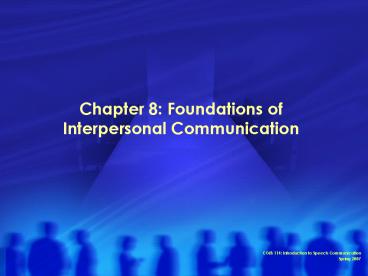Chapter 8: Foundations of Interpersonal Communication - PowerPoint PPT Presentation
1 / 19
Title:
Chapter 8: Foundations of Interpersonal Communication
Description:
Johari Window. Levels of Confirmation and Disconfirmation. Defensive and Supportive Climates ... Johari Window ... Johari Window. 3. Hidden ... – PowerPoint PPT presentation
Number of Views:235
Avg rating:3.0/5.0
Title: Chapter 8: Foundations of Interpersonal Communication
1
Chapter 8 Foundations of Interpersonal
Communication
2
Content
- Chapter check
- Activity
- Define Interpersonal Climate
- Define Self-disclosure
- Johari Window
- Levels of Confirmation and Disconfirmation
- Defensive and Supportive Climates
- Define Conflict
- Types of Responses
- Question to ponder on
3
Chapter Check
- Define INTERPERSONAL CLIMATE and SELF-DISCLOSURE
4
Activity Johari Window
- On the boxes, list things that are known or
unknown to YOU, AND your partner, best friend OR
parents.
Known to you
Unknown to you
Known to others
Unknown to others
5
Interpersonal Climate
- Overall feeling between people that arises
largely out of the ways people communicate with
each other - Feeling/atmosphere that we try to build in
different situations
6
Self-disclosure
- Revealing personal information about ourselves
that others are unlikely to discover on their own - We only self-disclose to people we trust
- Enhances closeness between people
- Invite others to self-disclose
- Can affect what we know about ourselves and how
we feel about who we are
7
Self-disclosure
- Guage of closeness
- Trust and understanding tend to grow
- Reciprocity is important - mutual relationship
8
Johari Window
- Model that describes different kinds of knowledge
related to individual growth and the development
of relationship with others - Open
- Known to both us and others
- 2. Blind
- - Information that others know about us but we
dont know about ourselves
9
Johari Window
- 3. Hidden
- Information we know about ourselves but choose
not to reveal to most others - 4. Unknown
- - Information that neither we nor others know
about us
10
Levels of Confirmation and Disconfirmation
- Recognition
- Basic form of confirmation
- Smile, greeting, etc.
- 2. Acknowledgement
- What others think and say
- Nodding, direct responses, etc.
11
Levels of Confirmation and Disconfirmation
- 3. Endorsement
- - Accepting anothers feelings or thoughts as
valid
12
Defensive and Supportive Climates
- Evaluation vs. Description
- Description - Describes behaviors without passing
judgment - Evaluation - Judging behaviors
- 2. Certainty vs. Provisionalism
- Certainty - being absolute only one answer
- Provisionalism - Expresses tentativeness about
our own ideas and openness to other points of
view
13
Defensive and Supportive Climates
- 3. Strategy vs. Spontaneity
- Strategy - having a plan
- Spontaneity - being spontaneous
- 4. Control vs. Problem - Orientation
- Control - triggers defensiveness
- Problem-orientation - focuses on finding answers
that satisfy everyone
14
Defensive and Supportive Climates
- 5. Neutrality vs. Empathy
- Neutrality - lack of regard and caring for others
- Empathy - confirms the worth of others and our
concern for their thoughts and feelings - 6. Superiority vs. Equality
- Superiority - making people feel that he/she is
better than others - Equality - treating people as equals
15
Conflict
- Exists when people who depend on each other have
different views, interests, or goals and perceive
their differences as incompatible. - Sign that people are involved with each other
- Overt Conflict
- exists when people express differences in a
straightforward manner - 2. Covert Conflict
- when partners deny disagreement/anger and express
it indirectly
16
Components of Conflict
- Conflict of Interest
- incompatible opinions, view points, goals or
interests that the conflict addresses - 2. Conflict Orientations
- - attitudes toward conflict
17
Components of Conflict
- 3. Conflict Responses
- behavioral responses to conflict, methods of
addressing conflict and conflict strategies - 4. Conflict Outcomes
- - whether and how conflict of interest is
resolved, how mutual the process is and how the
conflict process affects emotional closeness in a
relationship
18
Types of Responses
- Exit
- leaving a relationship
- 2. Neglect
- when a person denies or minimizes problems
- 3. Loyalty
- staying committed despite differences
- 4. Voice
- - talking about problems
19
Question to ponder on
- How do you resolve conflicts with parents,
siblings, friends or partners? Is there a
difference?































